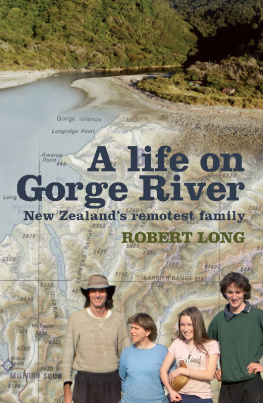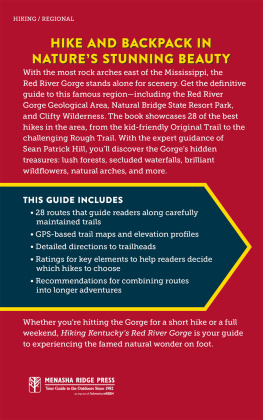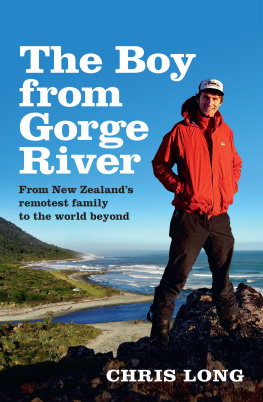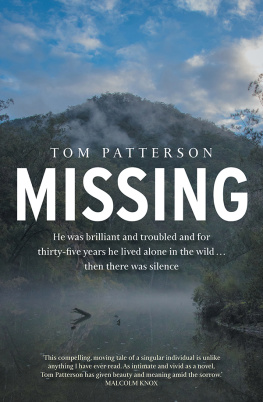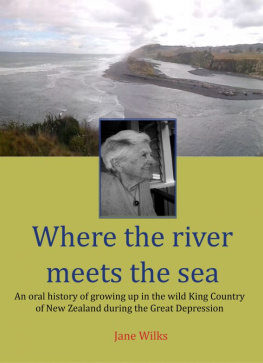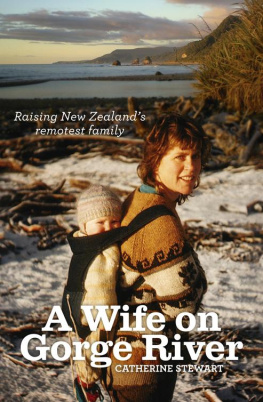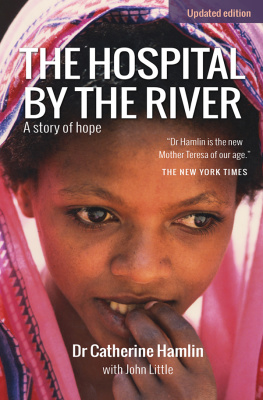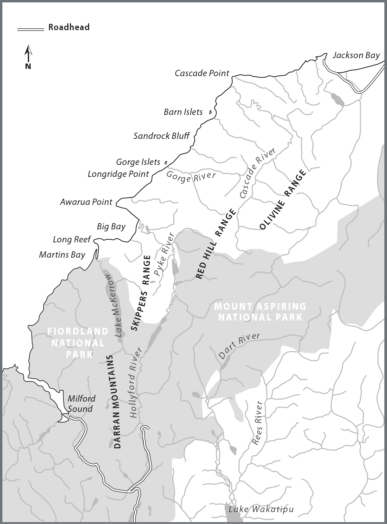S ometimes I lie awake at night thinking about how we are going to cross the Cascade. This mighty river separates us from the rest of humanity we are living in the never-nevers and the Cascade is the border.
We try to choose a window of opportunity between weather systems to give us enough time to walk from Gorge River up the coast, across the Spoon and Hope Rivers to Barn Bay. After a nights rest we head up the north bank of the Hope for two kilometres, then along the bottom of the foothills above Cascades Hermitage Swamp. Eventually we arrive at the middle Cascade flats and look for a suitable place to ford.
By the time our children, Christan and Robin, reached the age of about three and a half they had become too heavy to carry over long distances, but they were also becoming mobile enough to travel the terrain under their own steam. But a journey that in earlier years had taken one day on the shortest day of the year would now take us five days, allowing them to walk the 45-kilometre distance. We would break the walk to Barn Bay by staying a night at the Spoon River, where we left tents stashed on both sides of the river mouth. Then between Barn Bay and the Cascade Homestead we would stay at the Hope Hut, and then at Maurice Nolans beautiful rimu-lined musterers hut just south of the Cascade River.
Patience was the key as our children adapted readily to this adventure. When they were young either Catherine or I would hold their hands as they walked the long, sandy beaches or hopped across endless stretches of cobblestones and boulders. We would watch over them like falcons to ensure their welfare and safety. Mind over matter is a factor in any physical challenge, and the sooner you learn this, the easier the task will be.
On most occasions when we walk out, we make a point of not having a deadline to keep, otherwise we run the risk of pushing our luck with regard to the weather and the state of the river flows. Its important to be flexible. But occasionally we cant avoid having a time constraint, such as when theres a plane to catch.
In November 1996 we headed out to fly to Australia to celebrate my fathers seventieth birthday. Christan was five and Robin was just two, so she was still being carried in our backpacks. We needed two fine days to walk to Barn Bay. As we set off from Gorge River the water was dropping rapidly after the latest rain. We rowed the dinghy across the river, setting off at about midday to allow Christan time to walk the eight kilometres up to the Spoon. Once there we forded the river, found our tent stash and set up camp for the night. In the evening we lit a small campfire on the beach head, cooked up a meal and watched the waves rolling in. As we were making our way to bed the cloud began to thicken, then it turned to rain which persisted all night. We always carry a sheet of black plastic in case we need an emergency shelter, and this night we snuggled up warm and dry in our tent with the sheet of plastic acting as a tent fly.
By the next morning the Spoon was flooded, and we knew we would not be able to ford the Hope and reach Barn Bay. We would have to sit tight. We only had enough food to reach Barn Bay, so to conserve energy I lay in the tent until the afternoon when the tide was out and I was able to forage for mussels. We fed Christan and Robin as usual but Catherine and I were on rations. After eating the mussels we also drank the mussel water to help keep us going.
When we awoke the next morning, hoping for a fine sunny day of course, it sounded as if there was a light rain outside. Luckily this just turned out to be the movement of thousands of persistent sandflies between the tent and the fly. When we peered out the sun was blazing away and the streams were dropping. We were soon packed up and on the way to Barn Bay.
This was a big day for us all, especially Christan, since we had to climb up over a large sea bluff and then boulder-hop for the rest of the day. Bluff Creek was still running high, but by the afternoon the Hope had subsided enough for us to ford it. We settled into Barn Bay for the night.
We had food stashed at Barn Bay, so we stocked up and headed off in the afternoon, aiming for the Hope Hut. This was just two kilometres upriver, but it meant the next days tramp would be that much shorter. We spent most of the following day dodging muddy puddles and windfalls before finally reaching the safety of Maurice Nolans hut.
I always love the walk out. The journey culminates in the fording of the Cascade River, but the whole journey is a memorable adventure for all of us. It is always fascinating when first walking inland from the ocean up the Hope River from Barn Bay then tramping through the forest for the rest of the day. At this point we have usually been by the sea constantly for about five months, with the continual sound of the ocean rolling in. Once deep within the forest the silence is almost tangible. Bird songs are much clearer while the base drone of the mountains can be heard. As we near the Cascade, the deep blue pools between powerful rapids emanate an awesome energy, drawing a deep respect from my inner being.
On this particular occasion, three days had elapsed since the latest rains. All my attention became focused on this water flow. The shape and position of the ford is forever changing, so I studied the tracks leading through the grass and gravel along the river bank and flats where people and vehicles had recently travelled. We finally recognised the place. The river had widened so that it was maybe a hundred metres across; the deeper water had gradually become shallower and quicker. Below the ford, the river narrowed once again to form a swift, strong rapid, a place to be avoided.
As we prepared for the crossing I changed into shorts and stowed my trousers in my pack. Luckily the ford appeared quite even, so Catherine, Robin and I started out, leaving Christan behind for the second trip. We stayed well above the rapid, entering where the water was a little deeper and going slightly with the current rather than fighting it. The swirling water was up to about the top of my thighs. Robin was perched in my pack, and Catherine was downstream of me, holding my hand. We kept up a steady momentum, leaning slightly upstream, our legs and knees in constant motion. As the current and riverbed slipped beneath us the fluid motion almost mesmerised me, but the numbing, clear water ensured a sense of place and kept us focused as we reached the intensity and depths midstream, sensing that the northern bank was eventually going to be won.
As the shallows welcomed us, I breathed a sigh of relief. I quickly headed up to the edge of the grassy flats and unpacked the padding around Robin, then removed her and all the other gear from my pack. I then headed straight back across the river to Christan, waiting patiently on the southern side. He climbed into my pack, I hoisted it to my shoulders and we forded once again.
As we strode out along the northern river bank towards the Martyr Homestead, our circulation revved up to ward off the cooling effect of the crossing. The journey now opened up in front of us. We had left the never-nevers once again, for the land of roads and bridges.
As the sands of time drift by we watch our children grow, finding their way in the wider world. The story of my own search, of how I found my true home in the southwest corner of the South Island of New Zealand, begins a long time ago. Memories always lead me back to my first beginnings, to the inner child we all know well.

